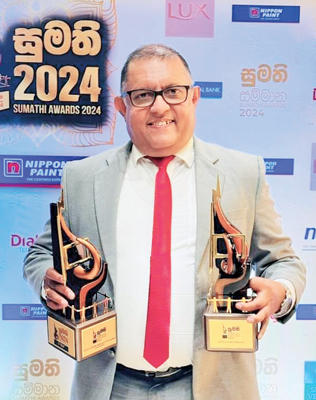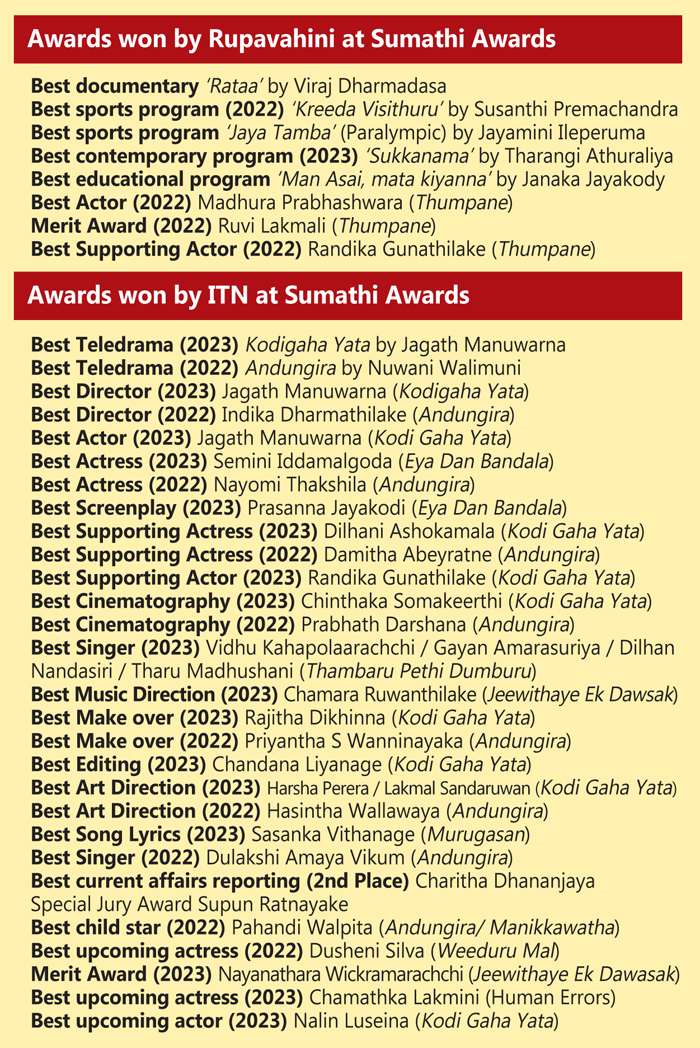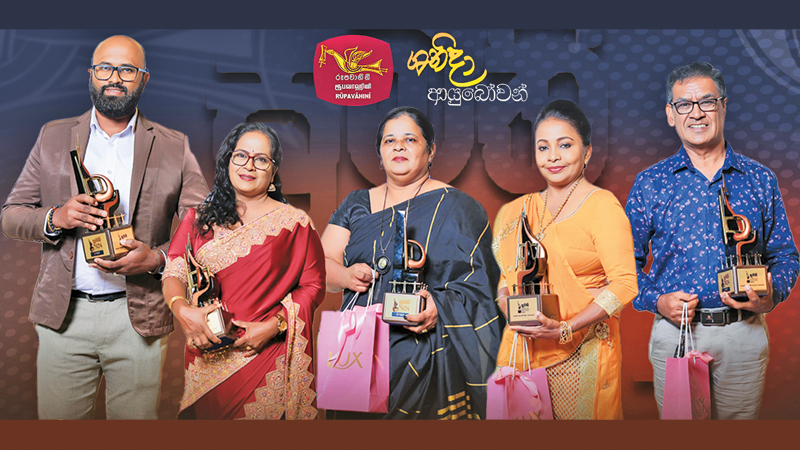 The 29th edition of the Sumathi Awards ceremony, which evaluates teledramas telecast on Sri Lankan television channels in 2022 and 2023, recently concluded. The Rupavahini Corporation and the Independent Television Network (ITN), two state-owned media entities, secured numerous awards in the festival. The Rupavahini Corporation won eight awards, while ITN won 29 awards, claiming the highest number of awards among television organisations at the festival. ITN was honoured as the top channel for both years.
The 29th edition of the Sumathi Awards ceremony, which evaluates teledramas telecast on Sri Lankan television channels in 2022 and 2023, recently concluded. The Rupavahini Corporation and the Independent Television Network (ITN), two state-owned media entities, secured numerous awards in the festival. The Rupavahini Corporation won eight awards, while ITN won 29 awards, claiming the highest number of awards among television organisations at the festival. ITN was honoured as the top channel for both years.
‘Kodi Gaha Yata’ by Jagath Manuwarna stole the limelight at the festival, securing ten awards, the highest number won by a single production. Manuwarna continues to make waves on social media, emerging as a frequent newsmaker with his ambitious debut efforts in both cinema and television. In the past couple of years, the ITN has captured the interest of television audiences, mainly due to its teledramas. The channel has been airing tele series that explore a range of contemporary themes, offering insight into the socio-political realities of the contemporary society.
Traditional television viewing at scheduled times has become increasingly rare, particularly among the urban middle class, as viewers are now more inclined to watch their favourite programs on platforms such as YouTube—a trend that has become the new normal. This shift poses a challenge for traditional television networks, given their high overhead costs.
In an interview with the Sunday Observer, ITN Chairman Sudarshana Gunawardana said, “By reaching out to lost audiences through social media platforms and monetising the content, we were able to regain viewership. The increased social media popularity could lead to attracting more sponsorships, indirectly benefiting the channel’s financial sustainability.”
Self-funded organisation

ITN Chairman Sudarshana Gunawardana
ITN operates as a self-funded organisation, making it crucial to secure sufficient funds for its operations. The success of any channel is intricately tied to its viewership. Peak viewing hours, typically between 6:30 pm and 10:00 pm, draw the majority of viewership, consequently generating the bulk of income. As such, channels, including ITN, often prioritise these peak hours, dedicating them primarily to a number of tele series.
Gunawardana highlighted two significant challenges facing ITN upon his appointment. Firstly, ITN’s status as a government channel resulted in a credibility issue among viewers, and secondly, the channel had been labelled as family-oriented and conservative. To effect a significant change, a radical twist had to be brought in, involving risk-taking.
However, Gunawardana and his team never hesitated to pursue it. He noted a lack of awards or recognition for the ITN in 2019 and 2020, except for rare instances like the acknowledgment received by tele series such as Koombiyo and Sahodarayo. Although in 2021 and 2022, the channel received awards for tele series such as ‘Sakarma’ and ‘Sapthambaraye Diga Dawasak’, Gunawardana said that those stories were based on very conservative and suburban backgrounds.
“We need to change that and maintain a consistent approach in broadcasting contemporary themes, which are unconventional for channels like ITN. The current younger audience is heavily influenced by TV series on international streaming platforms such as Netflix and Amazon. Therefore, it is crucial to engage this new audience by presenting innovative, modern themes that resonate with contemporary urban life. It was imperative to rebrand ITN beyond its image as a family channel with suburban themes. As a result, opportunities were provided to young artists to challenge taboos and introduce novelty to the channel, a move that proved to be highly successful. We hope that this twist has also influenced the selection perception of award festivals,” Gunawardana said.
With the rise of social media, traditional mediums like television have been significantly impacted, making it challenging to regain lost audiences. Recognising the emerging trends and challenges, ITN ventured into YouTube in 2018.
By the time Gunawardana assumed the role of Chairman in 2023, the subscriber base had grown to 1.1 million. Within a year, under clear guidance and a strategic plan, ITN increased its subscriber base to 2 million. Presently, the channel earns revenue through both monetisation and traditional sponsorship.
Cost-effective mode
“Despite the convenience of watching programs on YouTube, television remains the most cost-effective mode for viewers. Moreover, outside urban areas, television remains the primary entertainment source. It’s evident that our market share, advertising rates, and viewership have significantly increased over the past year. This surge in demand has allowed us to raise advertising rates. Since 2016, ITN has been operating at a loss, with 2018 marking its biggest deficit. In 2022, despite a sudden increase in electricity costs, I managed to reduce losses from Rs. 360 million to Rs. 160 million. This achievement was primarily due to strategic changes made in our primetime tele series,” Gunawardana said.
According to the selection criteria, the Sumathi Awards only considered tele series with less than 100 episodes for recognition. However, as Gunawardena acknowledged, mega tele series such as ‘Jaanu’ and ‘Divyadari’ have garnered the highest viewership among all the channel’s tele series, surpassing those of other channels.
Discussing the channel’s future plans, Gunawardana emphasized the importance of enhancing the technical aspects of the channel and providing more opportunities for young creators to explore more modern themes.
He highlighted the channel’s goal of improving the quality of its news and current affairs segments. Programs such as ‘Deepthi Samanga Paththaren Eha’ have gained significant traction, offering audiences a novel morning show experience. Current affairs programs such as ‘Kadapatha’ by K. W. Janaranjana and the flagship program ‘Thulawa’ by Sudarman Radaliyagoda have also achieved considerable audience reach. “We aim to introduce more current affairs programs in the future, catering to the intellectual interests of our audience.” Gunawardana said.







